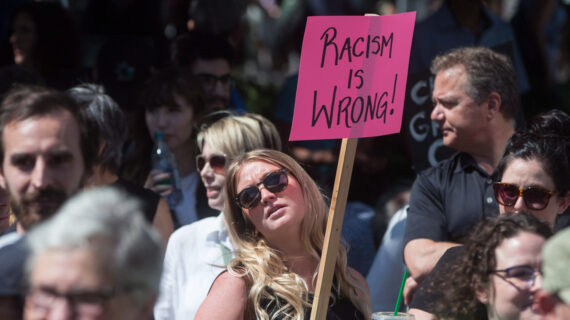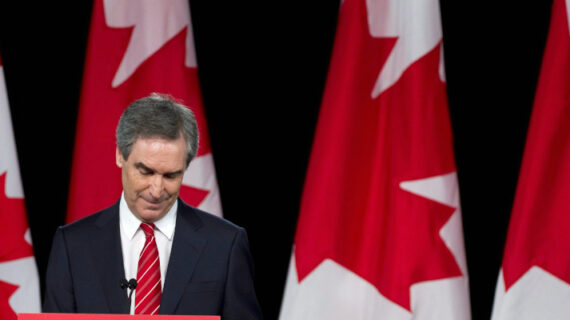In this Hub Dialogue, part of our new policy in action series, The Hub’s editor-at-large Sean Speer speaks to Michael Chong, the member of parliament for Wellington—Halton Hills and Conservative shadow minister of foreign affairs. Chong served as the minister of intergovernmental affairs in Stephen Harper’s government, before resigning to express opposition to a motion recognizing “the Québécois as a nation within a united Canada.” In 2015, Chong spearheaded a successful private member’s bill called the Reform Act which, among other powers, gives caucus the ability to remove the party leader. At the beginning of each parliament, party caucuses vote on whether or not they will be governed by the Reform Act.
This new series of dialogues will be removed from day-to-day partisanship or the “who’s up and who’s down” focus of the mainstream media, instead focusing on candid conversations with parliamentarians who are leading different issues that are important to Canada’s future.
This conversation has been revised and edited for length and clarity.
Sean Speer
MP Chong, you’re often associated with the 2015 Reform Act, which was a significant piece of legislation that you authored, and then ultimately steward through the parliamentary process. It was a major legislative accomplishment for a parliamentarian with a private member’s bill.
Do you want start by reflecting on first, the impetus behind the Reform Act and why you thought it was needed, second, the process that enabled it to pass with broad parliamentary support, and then finally, your thoughts on the extent to which it has come to influence the functioning of Parliament?
Michael Chong
On the impetus for the Reform Act, it’s based on a very old and long-standing principle that power shouldn’t be concentrated in any one person or any one place. And that a series of democratic checks and balances on power, where power is somewhat distributed within the system, is healthy for society. It’s healthy for longer-term outcomes.
I think that’s demonstrated when one reads history based on the evolution of democracy over the last several hundred years. And so, I think many people have concluded — many academic papers in recent decades — that there’s an ever-increasing concentration of power in party leaders, particularly the prime minister. It’s important to note that this has been going on for decades. It’s not the result of any one-party leader or any one party, but rather, a set of changes that have taken place over 50 plus years. And so, I still believe that it’s really important for us to continue to work to rebalance power in Ottawa. I think there’s still far too much power concentrated in party leaders, and particularly in the Prime Minister’s Office.
The Reform Act was an attempt, a first start, to try to rebalance that power between the party leaders, the prime minister, and elected members of parliament. We have to remember that in Canada, in our particular democratic system, voters only get one vote at the federal level, and that’s a vote for their locally-elected member of parliament. Unlike many other democracies, like the French Republic or the American Republic, people do not vote for senators. In our system, people don’t vote for the prime minister. The prime minister is appointed based on the governor general’s assessment of who has the confidence of the House of Commons. And senators are appointed by the prime minister. So, the role of the individually-elected MP is incredibly important, if we’re going to have democratic representation. And the Reform Act was an attempt to strengthen that role of the MP vis-à-vis the role of the party leader, particularly the prime minister.
The reason why I decided to proceed with written legislation is that I’ve come to the conclusion that because much of our Constitution is unwritten, and because much of the rules of the House of Commons are unwritten conventions, that over decades, those rules had changed. They had changed in favor of party leaders and the prime minister, and to the detriment of the role of the elected MP. And, no matter how much MPs were cajoled into trying to use these unwritten conventions and unwritten rules to rebalance power, they never did. Instead the unwritten conventions always seem to evolve in a way that favored further concentration of power in the Prime Minister’s Office.
So, I concluded that the only way we were going to move the dial back in the right direction was to introduce clear written rules in legislation that could not be ignored by party leaders and the prime minister. That was the reason why I decided to proceed with a written bill rather than going down another path of trying to encourage cultural change on the Hill, thereby achieving changes in unwritten conventions.
When the bill was introduced, it was far more ambitious than the one that was ultimately adopted by the House of Commons and Senate. I had decided early on in the process that perfection was the enemy of good, and that it was better to achieve some reform rather than not at all. So, the final version of the bill that was adopted by Parliament was a small step in the right direction. I don’t pretend that it produced revolutionary change on Parliament Hill, and I don’t think it addresses all the problems that result from the concentration of power. But it’s a small step in the right direction.
And since the bill’s adoption, I’ve noticed a bit of a cultural change on Parliament Hill; The Conservative Party caucus in the House of Commons has adopted a number of rules in the Reform Act, and I think it has led to a markedly different kind of culture and caucus.
Sean Speer
You spoke a bit about the parliamentary culture. If I can scale that up a bit, we’re kind of in an extraordinary moment in the realms of parliament, politics and governance and it’s not just the pandemic. At the present moment we have an acting Governor General, an acting Clerk of the Privy Council, a number of senior military roles unfilled, a government that is ignoring parliamentary motions, parliamentary sittings that haven’t followed conventional calendars and processes, and pandemic-related legislation and rules in place at all levels of government that are arguably unconstitutional.
As someone committed to parliamentary democracy and the principle of representative democracy, do you want to just to share your thoughts and reflections on the current moment in which we find ourselves, and any thoughts you may have about this drift away from abiding by the rules and conventions of our parliamentary system?
Michael Chong
Yeah, I think the pandemic has laid bare how much in need of reform our institutions are. The pandemic has laid bare the fact that many of our institutions are in crisis, and that they are not functioning as they were originally set up. I think we really do need to reform these institutions to strengthen them. I think that will be one of the revelations coming out of this pandemic – once we emerge out of this pandemic, and lockdowns and restrictions that we’ve all been subject to.
I think there’s some very worrisome events that took place in the last 12 to 18 months. We’ve touched on some of them, but there are many more. If you look at Parliament, it’s essentially been operating in a hybrid mode [in-person and virtual sittings], but it’s not been providing the accountability function. And I think the government’s mediocre handling of the pandemic is evidence of a set of institutions that are unable to hold the government fully accountable.
When you look at Canada’s response to the pandemic, we certainly did better than the United States or the United Kingdom at the onset of the pandemic. But we didn’t do as well as Australia or Taiwan, or other countries that actually achieved near zero COVID cases. And, when you look at the tail end of this pandemic, the United States and the United Kingdom have come roaring back. Their institutions were strong enough to build vaccine capacity, to build manufacturing capacity, to have the ecosystem necessary to provide the innovation that created these life-saving vaccines. And so, they have achieved remarkable success at the tail end of the pandemic. Canada hasn’t.
So, while we weren’t the worst at the beginning of the pandemic, and we’re not the worst at the tail end of the pandemic, I think the government’s response to the pandemic, at best, can be classified as mediocre. And I think that’s a reflection of a set of institutions, including Parliament, that are unable to really hold the government accountable and push them to do better.
If you look at our Canadian Armed Forces, they’re in complete crisis. There’s been seven resignations of the senior military brass in the last year. We essentially have a leaderless Armed Forces. We’re a G7 country, we’re a founding member of NATO, and yet we fail to have a military that has a leadership class that is able to guide this country through some pretty troubling and turbulent times on the world stage. And so, our military is in chaos — another institution that Parliament has not been able to hold accountable, and not been able to push to strive to excellence.
If you look at a whole range of other issues in the country, for example, we’ve got provinces now that have set up border control at their own borders. In my view, that’s a complete constitutional breakdown. I think provinces are well within their intra vires responsibilities and jurisdiction to set up controls within their own province to prevent people from moving from one province to the other. But, when it comes to setting up border control at provincial boundaries, that, in my view, is clearly federal jurisdiction. Only the federal government should be setting up, for example, border control between Ontario-Quebec, or between Nova Scotia and the rest of the country. But what we’ve seen is that provinces have unilaterally done this, and as a result, it’s another example of a breakdown in the constitutional order of this country. And you can go on.
I think it’s very worrisome some of the events are taking place. The fact that the government, at the outset of the pandemic, mere weeks into the pandemic, wanted to literally suspend Parliament for over a year and a half until the end of 2022, giving the Prime Minister’s Office the exclusive control and power to approve all spending and taxation, for what would have been a 21-month period, is astounding. The fact that government officials — including the cabinet and senior bureaucrats — thought that legislation like this was appropriate is beyond astounding. So, there’ll be a lot of time to read the tea leaves after we emerged from this pandemic. But, a lot of these events are very, very concerning about what they say about the state of our institutions.
Sean Speer
There’s a lot of insight there, MP Chong. I would just observe in response that not only are there first principle problems with the institutional sclerosis and decline that you described, but there are also practical consequences. One of the first bit of reporting that was published by The Hub in April 2021, documented the decline in trust across public and private institutions on the part of Canadians. It seems to me that protecting, strengthening, and sustaining the public’s trust ought to be a priority for policymakers and leaders across institutions. So, your warning is an important clarion call to The Hub’s readers.
If I can just wrap up with one final question and point of reflection: We’ve as a country had a series of tragic developments in recent weeks including the discovery of the bodies of 215 residential school students in Kamloops and the murder of a Muslim family in London, Ontario, that appears to have been influenced by the accused’s racism or Islamophobia. This has led to renewed conversations about the state of racism in Canada, and a view that the country has racism embedded in its DNA.
This is something, MP Chong, that you’ve spoken a bit about as the son of immigrants. Do you want to just reflect on some of these issues and how you’ve come to think about them, both at an intellectual level, but obviously drawing on your unique and kind of powerful personal experiences?
Michael Chong
Canada is one of the most tolerant and welcoming countries in the world. And over the last number of decades, it’s welcomed millions of people from around the world: from different faiths, different races, and different backgrounds. They’ve come here to make for themselves and their families new lives of hope and opportunity. It’s a remarkable country that we have built, unlike any other in the world. We should be proud of what we stand for, and proud of the fact that we have come together to build such a country.
That said, we’re not perfect. No country ever is. It’s clear that we have injustices in our country: injustices faced by indigenous peoples and various other groups across the country. So clearly, we have an imperfect country, and we have to do everything we can to address those injustices today.
But I don’t buy the argument that this is an inherently racist country. The evidence is otherwise. My parents were immigrants to this country, and I speak firsthand of this. My mother was a Dutch immigrant who came here after the second war, and my father was a Chinese immigrant who came here after the second war. I grew up as a biracial kid in rural Ontario in the 1970s. I didn’t fit into either classification of being Asian or European, and so I speak from experience when I say that there’s certainly racism and discrimination in Canada. I myself have experienced it firsthand.
But I believe fundamentally in what this country stands for: it’s based on timeless principles about a belief in human rights and liberty, a belief in the rule of law, and a belief in democratic institutions. And, I’m confident that if we continue to re-articulate these principles in the policies and actions we take today and in the future, we’ll continue to strive toward that better society where people can live their lives, with agency and under liberty.
I think what we’re facing not just here in Canada, but in many democracies in the West, is a crisis of confidence about these fundamental principles. And, I think that’s in part because of the rising apparent success of authoritarian countries like China and others who seem to be on a trajectory to much greater prosperity, and much better outcomes than democracies. But in the long run, I believe that democracies with their principles of human rights and the rule of law will triumph, because history demonstrates that they always have in the past. Democracies may be a very inefficient way to make decisions; trying to gather people together to achieve a consensus about the path forward is never an easy thing to do. Systems where power is concentrated in one person are much more efficient in arriving at these decisions. But history demonstrates in the long run that democracies have always prevailed because of these checks and balances of power.
Sean Speer
Well, that’s a thoughtful response, and a signal to a path forward for our country and our society. We’re grateful, MP Chong, for your personal leadership and your insights today about strengthening our institutions and reversing the crisis of confidence that, as you say, seems to be at the core of some of the challenges facing Canada and other Western countries. Thank you so much for being part of today’s Hub Dialogue and for sharing your insights and perspective.
Michael Chong
Well, it’s been great to be here, Sean, thanks for having me.




